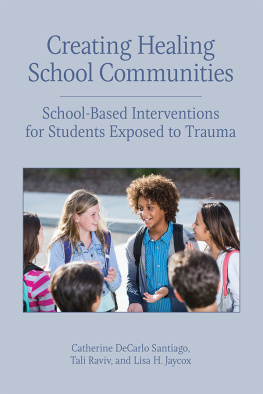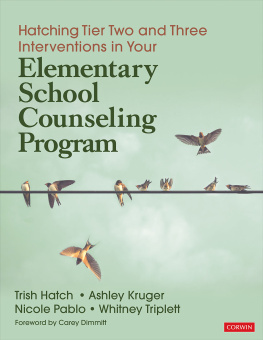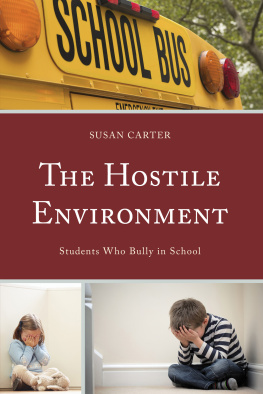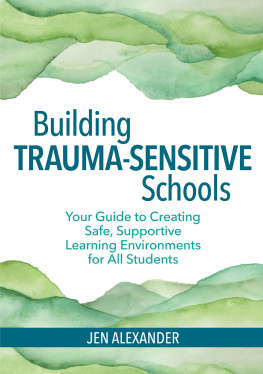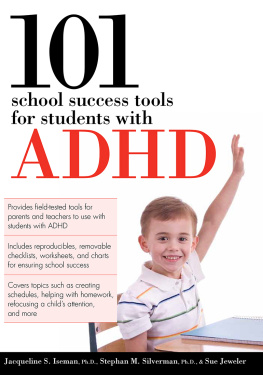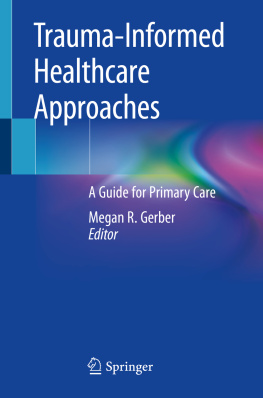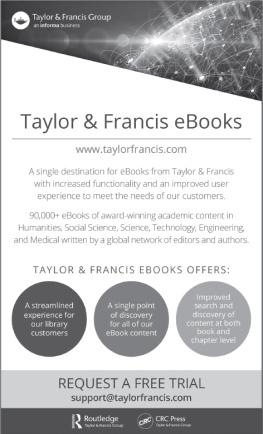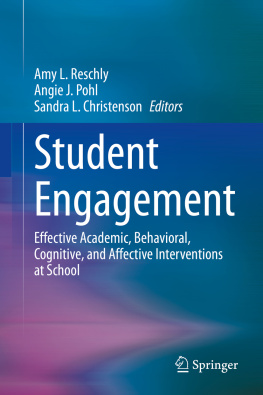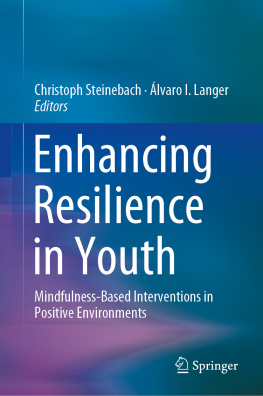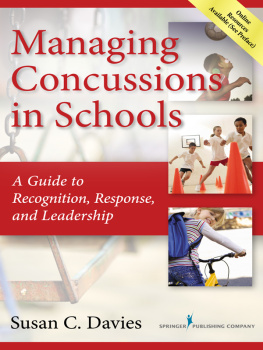Concise Guides on Trauma Care Series
Child Maltreatment: A Developmental Psychopathology Approach
Kathryn A. Becker-Blease and Patricia K. Kerig
Creating Healing School Communities: School-Based Interventions for Students Exposed to Trauma
Catherine DeCarlo Santiago , Tali Raviv , and Lisa H. Jaycox
Microaggressions and Traumatic Stress: Theory, Research, and Clinical Treatment
Kevin L. Nadal
Treating Infants and Young Children Impacted by Trauma: Interventions That Promote Healthy Development
Joy D. Osofsky , Phillip T. Stepka , and Lucy S. King
Treating PTSD With Cognitive-Behavioral Therapies: Interventions That Work
Candice M. Monson and Philippe Shnaider
Understanding Elder Abuse: A Clinicians Guide
Shelly L. Jackson
Copyright 2018 by the American Psychological Association. All rights reserved. Except as permitted under the United States Copyright Act of 1976, no part of this publication may be reproduced or distributed in any form or by any means, including, but not limited to, the process of scanning and digitization, or stored in a database or retrieval system, without the prior written permission of the publisher.
Electronic edition published 2018.
ISBN: 978-1-4338-2863-8 (electronic edition).
The opinions and statements published are the responsibility of the authors, and such opinions and statements do not necessarily represent the policies of the American Psychological Association.
Published by American Psychological Association 750 First Street, NE Washington, DC 20002 www.apa.org | APA Order Department P.O. Box 92984 Washington, DC 20090-2984 Phone: (800) 374-2721; Direct: (202) 336-5510 Fax: (202) 336-5502; TDD/TTY: (202) 336-6123 Online: http://www.apa.org/pubs/books E-mail: |
In the U.K., Europe, Africa, and the Middle East, copies may be ordered from
Eurospan Group
c/o Turpin Distribution
Pegasus Drive
Stratton Business Park
Biggleswade Bedfordshire
SG18 8TQ United Kingdom
Phone: +44 (0) 1767 604972
Fax: +44 (0) 1767 601640
Online: https://www.eurospanbookstore.com/apa
E-mail:
Cover Designer: Mercury Publishing Services, Inc., Rockville, MD
Library of Congress Cataloging-in-Publication Data
Names: Santiago, Catherine DeCarlo, author. | Raviv, Tali, author. | Jaycox, Lisa, author.
Title: Creating healing school communities : school-based interventions for students exposed to trauma / Catherine DeCarlo Santiago, Tali Raviv, and Lisa H. Jaycox.
Description: First edition | Washington, DC : American Psychological Association, [2018] | Series: Concise guides on trauma care book series | Includes bibliographical references.
Identifiers: LCCN 2017031131| ISBN 9781433828621 | ISBN 1433828626
Subjects: LCSH: School children--Mental health services. | Psychic trauma in children. | Post-traumatic stress disorder in children. | Counseling in education.
Classification: LCC LB3430 .S27 2018 | DDC 371.7/13--dc23
LC record available at https://lccn.loc.gov/2017031131
British Library Cataloguing-in-Publication Data
A CIP record is available from the British Library.
First Edition
http://dx.doi.org/10.1037/0000072-000
10 9 8 7 6 5 4 3 2 1
We dedicate this book to students facing adversities and hope that it might help make schools supportive and healing environments, so that you can learn and thrive.
Series Foreword
E xposure to traumatic events is all too common, increasing the risk for a range of significant mental problems, such as posttraumatic stress disorder (PTSD) and depression; physical health problems; negative health behaviors, such as smoking and excessive alcohol consumption; impaired social and occupational functioning; and overall lower quality of life. As mass traumas (e.g., September 11, military engagements in Iraq and Afghanistan, natural disasters such as Hurricane Katrina) have propelled trauma into a brighter public spotlight, the number of trauma survivors seeking services for mental health consequences will likely increase. Yet despite the far-ranging consequences of trauma and the high rates of exposure, relatively little emphasis is placed on trauma education in undergraduate and graduate training programs for mental health service providers in the United States. Calls for action have appeared in Psychological Trauma: Theory, Research, Practice, and Policy with such articles as The Need for Inclusion of Psychological Trauma in the Professional Curriculum: A Call to Action by Christine A. Courtois and Steven N. Gold (2009) and The Art and Science of Trauma-Focused Training and Education by Anne P. DePrince and Elana Newman (2011). The lack of education in the assessment and treatment of trauma-related distress and associated clinical issues at undergraduate and graduate levels increases the urgency to develop effective trauma resources for students as well as postgraduate professionals.
The Concise Guides on Trauma Care series addresses that urgent need by providing truly translational books that bring the best of trauma psychology science to mental health professions working in diverse settings. To do so, the series focuses on what we know (and do not know) about specific trauma topics, with attention to how trauma psychology science translates to diverse populations (diversity broadly defined, in terms of development, ethnicity, socioeconomic status, sexual orientation, and so forth).
This series represents one of many efforts undertaken by Division 56 (Trauma Psychology) of the American Psychological Association to advance trauma training and education (e.g., see http://www.apatraumadivision.org/3/directory-resources-links.html). We are pleased to work with Division 56 and a volunteer editorial board to develop this series, which continues to move forward with the publication of this important guide by Catherine DeCarlo Santiago, Tali Raviv, and Lisa H. Jaycox on school-based interventions for students exposed to trauma. This volume offers a practical and accessible guide for how to infuse school systems with trauma-informed practices that would be beneficial to children and youth exposed to trauma. Improving schools capacity to address the trauma-related mental health needs of students in order to support their learning and success is relevant to educators, school-based mental health providers, researchers, and policymakers alike. Santiago and colleagues integrate empirical information with practical implementation considerations while offering a useful overview of school-based prevention and intervention strategies. This practical book, grounded in scientific data, will be of great use to any professional working with children in the school system. Future books in the series will continue to address a range of assessment, treatment, and developmental issues in trauma-informed care.
Ann T. Chu
Anne P. DePrince
Series Editors
Foreword
W ithin schools across the United States, there are students who repeatedly challenge the adults in front of them. These challenges manifest in various ways, including verbal outbursts and aggression, refusal to engage in the learning environment, apathy, absenteeism, walking out of the classroom, and more. Some children push our buttons, sometimes over and over again. Naturally, this can cause us to question why we choose to work in schools, especially in schools that serve at-promise (formerly at-risk) students. Sometimes we leave work thinking, What did I do to deserve that? What is wrong with these kids? However, using a trauma lens encourages us to ask different questions, questions that push us to understand the lives of the students who present the greatest challenges to our practice. When we shift toward an effort to understand the underlying causes of students unpredictable negative behaviors, we may uncover the layers of trauma that affect their lives.

